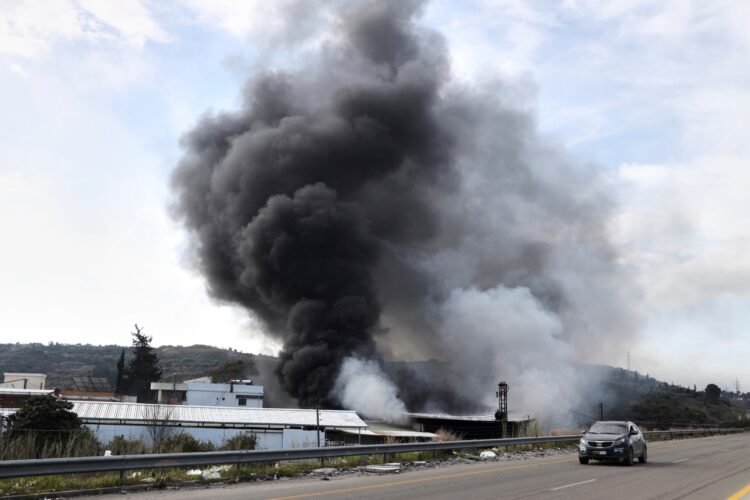BEIRUT — Armed groups loyal to former Syrian President Bashar Assad stormed three villages near Syria’s coast on Friday, killing nearly 70 men, according to a Syrian war monitor.
The Britain-based Syrian Observatory for Human Rights reported that the attacks took place in the villages of Sheer, Mukhtariyeh, and Haffah.
“They killed every man they encountered,” said Rami Abdurrahman, the head of the Observatory, referring to the gunmen who targeted residents from the Alawite sect, the minority group to which Assad belongs.
Abdurrahman stated that 69 men were executed, while women and children were left unharmed.
Beirut-based Al-Mayadeen TV reported that over 30 men were killed in Mukhtariyeh alone after being separated from women and children. Others were shot in Sheer and Haffah.
Syria’s state-run news agency SANA quoted an unnamed security official who blamed the violence on attacks by Assad loyalists against police officers. The official said large numbers of people then fled to coastal areas, leading to “individual violations” that authorities were working to contain.
The latest killings bring the death toll to 147 since clashes erupted between government forces and Assad loyalists on Thursday.
Assad Loyalists Challenge Syria’s New Government
The ongoing violence marks a major escalation in Syria’s coastal region and presents a direct challenge to the country’s new Islamist-led government. The current authorities in Damascus, former insurgents who ousted Assad in December, have promised to reunify the country after 14 years of devastating civil war.
On Thursday, clashes erupted in what appeared to be a coordinated assault by Assad loyalists across the region. In response, the government deployed reinforcements to the coastal cities of Latakia and Tartus, as well as surrounding towns and villages—traditionally strongholds of Assad’s Alawite support base.
State media reported that the situation remained tense, with a heavy military presence in Latakia and an ongoing curfew in the city and other coastal areas. While security forces reported minor skirmishes in some neighborhoods, most of Latakia remained under government control.
Monitors Report Heavy Casualties
The Syrian Observatory for Human Rights reported that at least 35 government security personnel, 32 Assad loyalists, and four civilians had been killed in the clashes.
According to Abdurrahman, the outskirts of Baniyas and Jableh, as well as Assad’s hometown of Qardaha, remain under the control of Assad loyalists, along with several nearby Alawite villages.
A resident of Qardaha described the situation as “very bad” in a message to The Associated Press, saying government forces were firing heavy machine guns in residential areas. Another resident, speaking anonymously for security reasons, said locals had been trapped in their homes since Thursday afternoon due to the intensity of the fighting.
Fears of Rising Sectarian Violence
Experts warn that the recent escalation could lead to deeper sectarian tensions in Syria.
Gregory Waters, a fellow at the Middle East Institute who has studied Syria’s coastal regions, said he does not expect full-scale conflict to break out between the two sides. However, he warned that the fighting could trigger cycles of sectarian violence along the coast.
Waters also cautioned that heavy-handed government actions could push more young Alawite men to take up arms against the new government, deepening divisions.
According to the Observatory, the clashes began when security forces attempted to arrest a wanted individual near Jableh but were ambushed by Assad loyalists.
Calls for Russian Intervention
As violence escalated, scores of people gathered outside Russia’s main air base near Jableh, pleading for protection from Moscow.
Russia, which backed Assad’s government in Syria’s war since 2015, has maintained ties with the new authorities in Damascus after Assad’s fall. The former president has been living in Moscow since December, after fleeing Syria as opposition forces neared Damascus.
When asked about the situation, Kremlin spokesperson Dmitry Peskov assured reporters that Russian military forces in Syria remained secure.
“The security of our military is ensured at the proper level,” Peskov said, adding that he would not comment on Syria’s operational situation as “we don’t know the details.”
Turkey Warns of Escalating Violence
Turkey, which previously supported Syrian opposition forces against Assad, expressed concern over the escalating violence in Latakia.
Turkish Foreign Ministry spokesperson Oncu Keceli warned that the instability could “undermine efforts to unite Syria’s future in solidarity” and called for restraint.
“At this critical juncture, the targeting of security forces could undermine efforts to rebuild Syria in unity and peace,” Keceli said on X (formerly Twitter).
He stressed that “such provocations must not be allowed to endanger peace in Syria and the region” and reaffirmed Turkey’s opposition to “any action that threatens Syrians’ right to live in stability.”
A Nation Still in Turmoil
Syria’s civil war, which began in 2011, has killed over 500,000 people and displaced millions. Despite Assad’s removal from power, his loyalists remain active, particularly in Alawite strongholds along the coast.
The latest clashes suggest that while the war has entered a new phase, Syria’s deep-seated sectarian and political divisions remain far from resolved.

 English
English



























































